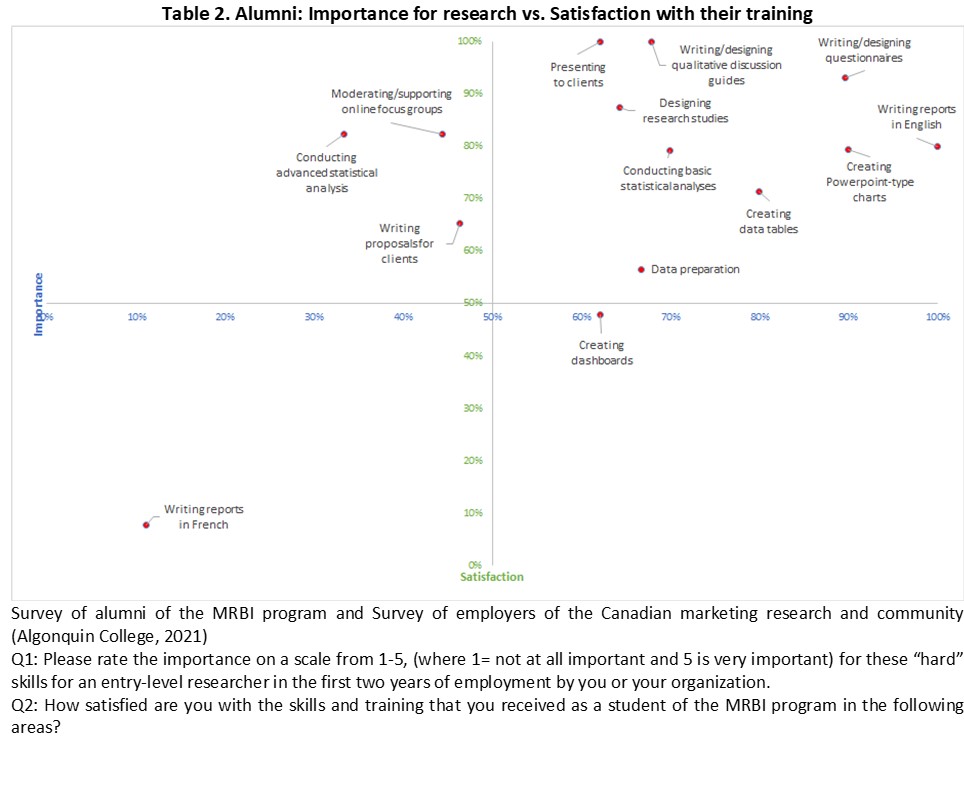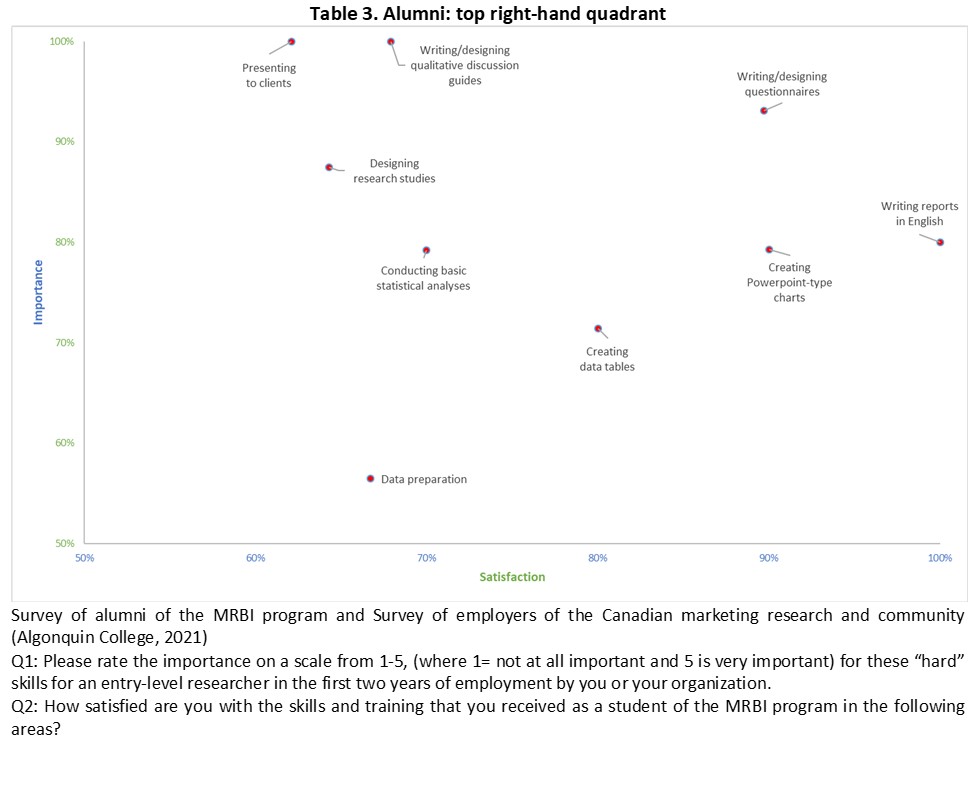Marketing Research Skills for Success is an ongoing feature in foresight showcasing the unique skills and training needs to thrive in today’s industry. Inaugural bloggers to this section Miguel Huapaya Toledo and Tasnim Islam blog about their research and study on the skills needed for today’s entry-level researchers in three blog posts.
Required “Hard” Skills for Marketing Research Professionals
By Miguel Huapaya Toledo and Tasnim Islam
By definition, the word skill means the ability to do an activity or job well developed through training and experience (Cambridge Dictionary, n.d.), and research skills could be defined as the “ability to find an answer to a question or a solution to a problem” (Indeed, 2021a).
A study conducted by the Marketing Research & Business Intelligence (MRBI/ MRA)/ program at Algonquin College in cooperation with CRIC and CAIP determined the required skills that entry-level researchers should need in their first two years in the workplace. A survey of employers in the Canadian marketing research industry and community, and a survey of alumni of the MRBI program at Algonquin College, were conducted to reveal those skills.
In this first of three blog posts or articles for foresight‘s skills for success series, we will share the results of the study in the following order. In this first article, we will discuss the “hard” skills that employers expect from entry-level employees fresh out of colleges or universities. In the second, we will focus on the “soft” skills or attributes that entry-level researchers need to succeed. In the third of the series, we will discuss the views of survey participants on how to improve “hard” and “soft” skill levels of entry-level researchers for success in the workplace.
The focus of this article is to discuss the “hard” skills that an entry-level marketing research professional is expected to have. Hard skills involve technical training that people know through their past or current experience (Indeed, 2021b).
Based on the CAIP competency framework, the study lists some “hard” (or technical) skills to measure 1) their level of importance in the workplace and 2) the level of employer or alumni satisfaction with recent graduates possessing those skills.
“Hard” skills used in the study: Writing reports in English; Writing reports in French; Creating PowerPoint-type charts; Creating data tables; Presenting to clients; Conducting basic statistical analyses; Conducting advanced statistical analyses; Data preparation; Moderating/supporting online focus groups; Creating dashboards; Writing/designing questionnaires; Writing/designing qualitative discussion guides; Designing research studies; Writing proposals for clients.

Conducting basic statistical analysis, creating PowerPoint charts and writing reports were the top three “hard” skills that employers considered to be important. In addition, at least 80% of employers also considered designing research studies and questionnaires, preparing raw data for analysis, creating data tables as important. Regarding employers’ satisfaction with graduates’ performance: 80% were satisfied with the students’ abilities in creating PowerPoint type chart, 70% with basic statistical analysis skills, and 60% with report writing, creating data tables, presentation, data preparation skills.
Table 1 also indicates low satisfaction with the more complex yet important hard skills such as writing proposals for clients, designing research studies, writing/designing qualitative discussion guides and conducting advanced statistical analysis potentially suggesting that these are not acquired through post-secondary education training programs but better obtained through on-the-job industry-experience that accumulates over time: for example, acquiring highly technical skills in creating dashboards.


According to the survey, more than 80% of alumni of the Algonquin College MRBI program identified writing reports, creating PowerPoint-type charts, designing questionnaires, and creating data tables as essential skills for an entry-level researcher. In addition, conducting basic statistical analysis, designing qualitative discussion guides, preparing data for analysis, designing research studies were other important skills to have. Regarding the satisfaction among alumni on their training received from their alma mater’s MRBI program: 100% were satisfied with presenting to clients and writing-designing questionnaires, followed by (between 70% and 85%) moderating focus groups, designing research studies and writing reports. Alumni expressed somewhat less satisfaction (but still exceeding 70%) with creating PowerPoint type charts and doing basic statistical analysis.
The takeaways for this article would be the list of “hard” skills that both alumni and employers stated as required in the marketing research industry, are: creating PowerPoint-type charts, writing reports in English, designing questionnaires, creating data tables, conducting basic statistical analysis, and preparing data.
Methodology:
The study was conducted in cooperation with CRIC and CAIP, under the supervision of Algonquin College professors Nathaniel Stone and Todd Armstrong.
Survey of employers in the Canadian marketing research industry and community: Online survey with Survey Monkey; from June 1st to June 21, 2021; 51 completed responses; Language: English and French.
Survey of alumni of the MRBI program: Online survey with Survey Monkey; from June 1st to June 11, 2021; 30 completed responses; Language: English.
References:
Algonquin College (2021). Survey of alumni of the MRBI program and Survey of employers in the Canadian marketing research industry. https://algonquinlivecom-my.sharepoint.com/:b:/g/personal/huap0001_algonquinlive_com/EUbbZIUvO31JggGJxGqXGu4BbQuJDDfO2tG52DqxTvmBBg?e=SC24Yd
Cambridge Dictionary (n.d.). Meaning of Skill in English. Retrieved from: https://dictionary.cambridge.org/dictionary/english/skill
Indeed (2021a). Research skills: Definition and examples. Retrieved from: https://www.indeed.com/career-advice/career-development/research-skills
Indeed (2021b). Hard skills vs. Soft skills. Retrieved from: https://ca.indeed.com/career-advice/resumes-cover-letters/hard-skills
About the Authors:


Miguel Huapaya Toledo and Tasnim Islam are graduating students of the final semester of the Marketing Research & Business Intelligence (MRBI) program at Algonquin College and they have been working on several projects within the College.
If you liked this blog post, also stay tuned for CRIC’s upcoming webinar on August 24 “Careers in Marketing Research: Opportunities in the Coming Decade” featuring a range of perspectives and experts as they weigh in on the marketplace.

